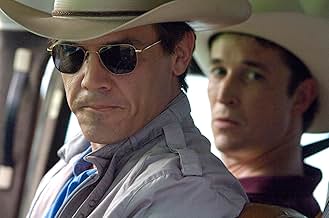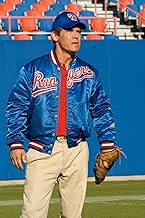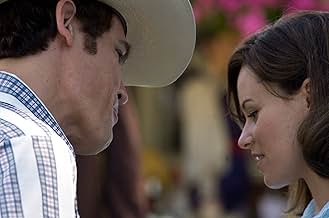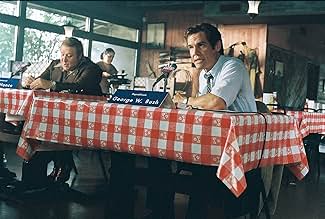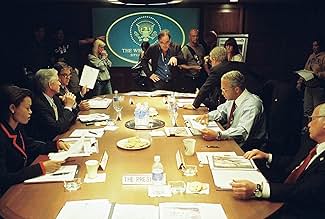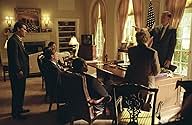AVALIAÇÃO DA IMDb
6,3/10
51 mil
SUA AVALIAÇÃO
Uma crônica da vida e presidência de George W. Bush.Uma crônica da vida e presidência de George W. Bush.Uma crônica da vida e presidência de George W. Bush.
- Prêmios
- 1 vitória e 8 indicações no total
Thandiwe Newton
- Condoleezza Rice
- (as Thandie Newton)
Avaliações em destaque
A chronicle on the life and presidency of George W. Bush (Josh Brolin).
The worst thing about this film is the awful casting, with many people looking nothing like who they should be. Karl Rove looks like a doofus and Condoleeza Rice sounds worse than Fran Drescher. Some are pretty good, and at least you can usually tell who each person is supposed to be. But, my goodness, maybe the casting director needed more time.
The film is fun and enjoyable so long as you understand it is satire. Yes, Oliver Stone is a left-leaning guy, sometimes to an extreme. But this is obviously not meant to be a serious biopic, but more a look at the foibles of George W. Bush. Surprisingly, there are moments that really humanize the guy, and for that Stone deserves credit for pulling punches.
The worst thing about this film is the awful casting, with many people looking nothing like who they should be. Karl Rove looks like a doofus and Condoleeza Rice sounds worse than Fran Drescher. Some are pretty good, and at least you can usually tell who each person is supposed to be. But, my goodness, maybe the casting director needed more time.
The film is fun and enjoyable so long as you understand it is satire. Yes, Oliver Stone is a left-leaning guy, sometimes to an extreme. But this is obviously not meant to be a serious biopic, but more a look at the foibles of George W. Bush. Surprisingly, there are moments that really humanize the guy, and for that Stone deserves credit for pulling punches.
With his "in the moment" biopic "W." the normally volatile Oliver Stone wisely saves his judgments for history when hindsight will be 20/20. Achingly subdued and slightly satirical, Stone plays it straight and to the bone. Here he presents us with the early years of our current lame duck president, showing Dubya rushing a frat-house at Yale, meeting Laura at a barbecue, living in the shadow of his father and brother, his troubles holding down a job, his failed bid to become baseball commissioner, and his defining moment when he gives up drinking and becomes born-again. All of which leads us to his first term and the Iraq War quagmire, where Dubya honest-to-goodness truly believes "God" wanted him to become president and that Iraq did have those rascally WMD.
In the lead role, Josh Brolin is an endearingly bumble-headed Dubya, and Stone presents him as a simple-minded man with good intentions who has been crippled by his "daddy issues" and has surrounded himself with the most cynical, self-serving, and corrupt administration in modern American history. The supporting cast is a hoot, with highlights including Thandie Newton eliciting big laughs just with her facial expressions as a wicked and moronically faithful Condi Rice, Elizabeth Banks giving a winning portrayal of Laura Bush, and Richard Dreyfuss playing Cheney as the most insipid megalomaniac American politics has ever seen.
Stone accomplishes three major coups here that should surprise those who expected a one-sided liberal smear job. First, he humanizes George W. Bush. The director does this with savvy editing showing the back-story of why Dubya does the things he does (i.e. why he uses nicknames for everyone or why running three miles every day is so important to him), and then juxtaposing that with the inane decisions he has made as president. By utilizing actual transcripts from press conferences, news coverage, and meetings, Stone and scribe Stanley Weiser allow Bush and his administration to speak for themselves, and it's both comically cathartic and occasionally frightening to see it dramatized so well. Second, he redeems the presidency of George "Poppy" Bush (a somewhat miscast but still effective James Cromwell) by showing what a restrained and thoughtful Commander in Chief he was compared to his naive and too-eager-to-please son. Thirdly, he redeems the legacy of Colin Powell (a surprisingly good Jeffrey Wright), who is shown here as the only person in the administration with any hindsight or foresight, and the only sane voice who questioned the motives for entering Iraq, though he eventually caved in and played along. His "f-you" to Cheney towards the film's final act is priceless.
As the actual presidency still has a few months to go at the time of the film's release, Stone's biopic was never written a true ending, leaving us with a symbolic image of Dubya looking up to the sky in center field waiting to catch a ball that will never drop. It may be another twenty years before we can pass any accurate judgment on Dubya's legacy, and likewise, Stone's film will have to wait. It's going to be a long time before anyone catches all those balls George W. Bush's administration threw up in the air.
In the lead role, Josh Brolin is an endearingly bumble-headed Dubya, and Stone presents him as a simple-minded man with good intentions who has been crippled by his "daddy issues" and has surrounded himself with the most cynical, self-serving, and corrupt administration in modern American history. The supporting cast is a hoot, with highlights including Thandie Newton eliciting big laughs just with her facial expressions as a wicked and moronically faithful Condi Rice, Elizabeth Banks giving a winning portrayal of Laura Bush, and Richard Dreyfuss playing Cheney as the most insipid megalomaniac American politics has ever seen.
Stone accomplishes three major coups here that should surprise those who expected a one-sided liberal smear job. First, he humanizes George W. Bush. The director does this with savvy editing showing the back-story of why Dubya does the things he does (i.e. why he uses nicknames for everyone or why running three miles every day is so important to him), and then juxtaposing that with the inane decisions he has made as president. By utilizing actual transcripts from press conferences, news coverage, and meetings, Stone and scribe Stanley Weiser allow Bush and his administration to speak for themselves, and it's both comically cathartic and occasionally frightening to see it dramatized so well. Second, he redeems the presidency of George "Poppy" Bush (a somewhat miscast but still effective James Cromwell) by showing what a restrained and thoughtful Commander in Chief he was compared to his naive and too-eager-to-please son. Thirdly, he redeems the legacy of Colin Powell (a surprisingly good Jeffrey Wright), who is shown here as the only person in the administration with any hindsight or foresight, and the only sane voice who questioned the motives for entering Iraq, though he eventually caved in and played along. His "f-you" to Cheney towards the film's final act is priceless.
As the actual presidency still has a few months to go at the time of the film's release, Stone's biopic was never written a true ending, leaving us with a symbolic image of Dubya looking up to the sky in center field waiting to catch a ball that will never drop. It may be another twenty years before we can pass any accurate judgment on Dubya's legacy, and likewise, Stone's film will have to wait. It's going to be a long time before anyone catches all those balls George W. Bush's administration threw up in the air.
The last of Stone's "Presidential" trilogy after JFK (which was better) and Nixon (which wasn't), "W" relates the days of the USA's 43th President, George W Bush.
It came up as the heat about the subject's presidency was still felt, while opinions were still hot, and yet the movie is surprisingly subtle and empathic, walking a fine line between biopic and comedy. Also, it is neither an attack on the Bushes, or on the Republican party - what would have been expected from rather liberal Stone. In fact, Bush the father's sole term is even referenced as a time of sober wisdom and sound management. Despite Stone's haste, the film stands the test of time admirably.
Actors are absolutely remarkable and well-directed, everyone of them. Photography is expertly executed. Music is, however, of some curiosity, and its circus-like presence does a big part in lightening the tone. That odd tonal dysphoria makes the film quite hard to classify, and even for the interested, a second viewing might be necessary once the expectations are out of the way.
All in all, what we have here is a fine movie. If you are an American conservatives, or even someone who voted Bush in, I really don't think you'll be outraged by anything here, to the contrary, maybe, as Bush is made human beyond the drama/comedy of his administration. I heard Clinton personally gave Bush a copy of the movie, saying he'd like it.
It came up as the heat about the subject's presidency was still felt, while opinions were still hot, and yet the movie is surprisingly subtle and empathic, walking a fine line between biopic and comedy. Also, it is neither an attack on the Bushes, or on the Republican party - what would have been expected from rather liberal Stone. In fact, Bush the father's sole term is even referenced as a time of sober wisdom and sound management. Despite Stone's haste, the film stands the test of time admirably.
Actors are absolutely remarkable and well-directed, everyone of them. Photography is expertly executed. Music is, however, of some curiosity, and its circus-like presence does a big part in lightening the tone. That odd tonal dysphoria makes the film quite hard to classify, and even for the interested, a second viewing might be necessary once the expectations are out of the way.
All in all, what we have here is a fine movie. If you are an American conservatives, or even someone who voted Bush in, I really don't think you'll be outraged by anything here, to the contrary, maybe, as Bush is made human beyond the drama/comedy of his administration. I heard Clinton personally gave Bush a copy of the movie, saying he'd like it.
One word sums up how I felt while watching W: uncomfortable.
I went into this film expecting more of an absurdist comedy than a tragedy. The level of realism was far beyond what I expected. For the most part, the cast, makeup, and casting crew did such a good job with the characters that it was very easy to imagine that these were not actors on the screen but the actual people. Josh Brolin's characterization of W was certainly Oscar-worthy.
Even better than Brolin's part was Phedon Papamichael's photographic direction. The job of the Director of Photography is to bring the story to life through the creation of images to draw the attention of the viewer where the Director wants. Few films are as good of an example of this as W. Papamichael used the camera to force moral and emotional perspective in a way that I have rarely seen outside of the films of Stanley Kubrick. I've only seen the film once, viewing it as a complete work. I intend to watch it again to study the photography.
Overall, I thought the film was fair in its treatment of the actual people involved. The most ardent Bush supporters will not like it, but to still be that supportive of him in the final months of his second term, you either have to not be paying attention or be uncritical in all of your thought. While artistic license was taken throughout the film, the portrayal of all events and people, with the possible exception of Dick Cheney, were far more grounded in reality and recorded history than I expected.
The film made me uncomfortable on multiple levels, which is why it succeeds and deserves such a high rating. The portrayal of Bush's relationship with his parents, especially his father, forces the viewer to feel sorry for him. The overt religiosity that pervades the public service portion of his life must anger anyone who believes strongly in the separation of church and state. There are many moments when, with any other characters, the film should have generated much laughter. Only one moment in the film actually caused more than one person in the theater to laugh. I guess 4000+ dead soldiers drains the humor out of even the most hilarious gaffes.
I would recommend this film to anyone who wants to see a realistic portrayal of historical events. I wish Stone had waited until Bush was out of office to make it, though. While it captures the major events that were involved in building the Bush legacy, it ends far too early.
I went into this film expecting more of an absurdist comedy than a tragedy. The level of realism was far beyond what I expected. For the most part, the cast, makeup, and casting crew did such a good job with the characters that it was very easy to imagine that these were not actors on the screen but the actual people. Josh Brolin's characterization of W was certainly Oscar-worthy.
Even better than Brolin's part was Phedon Papamichael's photographic direction. The job of the Director of Photography is to bring the story to life through the creation of images to draw the attention of the viewer where the Director wants. Few films are as good of an example of this as W. Papamichael used the camera to force moral and emotional perspective in a way that I have rarely seen outside of the films of Stanley Kubrick. I've only seen the film once, viewing it as a complete work. I intend to watch it again to study the photography.
Overall, I thought the film was fair in its treatment of the actual people involved. The most ardent Bush supporters will not like it, but to still be that supportive of him in the final months of his second term, you either have to not be paying attention or be uncritical in all of your thought. While artistic license was taken throughout the film, the portrayal of all events and people, with the possible exception of Dick Cheney, were far more grounded in reality and recorded history than I expected.
The film made me uncomfortable on multiple levels, which is why it succeeds and deserves such a high rating. The portrayal of Bush's relationship with his parents, especially his father, forces the viewer to feel sorry for him. The overt religiosity that pervades the public service portion of his life must anger anyone who believes strongly in the separation of church and state. There are many moments when, with any other characters, the film should have generated much laughter. Only one moment in the film actually caused more than one person in the theater to laugh. I guess 4000+ dead soldiers drains the humor out of even the most hilarious gaffes.
I would recommend this film to anyone who wants to see a realistic portrayal of historical events. I wish Stone had waited until Bush was out of office to make it, though. While it captures the major events that were involved in building the Bush legacy, it ends far too early.
If you are looking for a probing analysis of the eight years of G. W. Bush's presidency, you would be better off reading the books that have already appeared by Woodward and others. At times, this biopic can't rise above sitcom level: the college hazing that is just dumb, not revelatory of Bush's character; the bickering that goes on around the table as Cheney takes on Powell; Rice and her sycophantic behavior around the President (she can't believe he is so uninformed, yet he is her mealticket). It sounds like an episode of Friends, yet you would have to call it Enemies.
Some commenters have taken Thandie Newton to task for her satirical portrait of Rice, but this is the tradition with Oliver Stone: somebody has to be the comedic relief. It was Joe Pesci and Tommy Lee Jones in JFK, James Woods in Nixon, and here we get Scott Glenn being wacky, Bruce McGill being oily and self-serving, Toby Jones being... what, exactly? I couldn't grasp what his take on Karl Rove was all about. Newton's burlesque is just part of the wallpaper in this film.
Some commenters have taken Thandie Newton to task for her satirical portrait of Rice, but this is the tradition with Oliver Stone: somebody has to be the comedic relief. It was Joe Pesci and Tommy Lee Jones in JFK, James Woods in Nixon, and here we get Scott Glenn being wacky, Bruce McGill being oily and self-serving, Toby Jones being... what, exactly? I couldn't grasp what his take on Karl Rove was all about. Newton's burlesque is just part of the wallpaper in this film.
Você sabia?
- CuriosidadesRichard Dreyfuss stated his disappointment with the film in an appearance on The View (1997). He said it was "6/8 of a good film" and called Oliver Stone "a fascist". Stone retorted in an interview that working with Dreyfuss "was the single worst experience I've ever had with an actor in my life."
- Erros de gravaçãoCheney says "Atta met Saddam's intel chief in Czechoslovakia." Czechoslovakia split into the Czech Republic and Slovakia in 1993, ten years earlier.
- Citações
Gen. Colin Powell: Funny Dick, I remember you once agreeing that going all the way in Baghdad would be a mistake.
Dick Cheney: Well, I think you made a bigger boo-boo Colin. You could have been president.
Gen. Colin Powell: Fuck you.
- Cenas durante ou pós-créditosAt the very end of the credits, you see a Christian cross with a period. It morphs into the W-period logo of the movie.
- ConexõesFeatured in Sunday AM: Episode #4.9 (2008)
- Trilhas sonorasThe Star Spangled Banner
Lyrics by Francis Scott Key and music by John Stafford Smith
Arranged by Francis Scott Key (as Francis Key) and Michael Licari
Provided by APM Music
Principais escolhas
Faça login para avaliar e ver a lista de recomendações personalizadas
Detalhes
- Data de lançamento
- Países de origem
- Centrais de atendimento oficiais
- Idiomas
- Também conhecido como
- Hijo de... Bush
- Locações de filme
- Empresas de produção
- Consulte mais créditos da empresa na IMDbPro
Bilheteria
- Orçamento
- US$ 25.100.000 (estimativa)
- Faturamento bruto nos EUA e Canadá
- US$ 25.534.493
- Fim de semana de estreia nos EUA e Canadá
- US$ 10.505.668
- 19 de out. de 2008
- Faturamento bruto mundial
- US$ 29.560.587
- Tempo de duração2 horas 9 minutos
- Cor
- Mixagem de som
- Proporção
- 2.35 : 1
Contribua para esta página
Sugerir uma alteração ou adicionar conteúdo ausente








